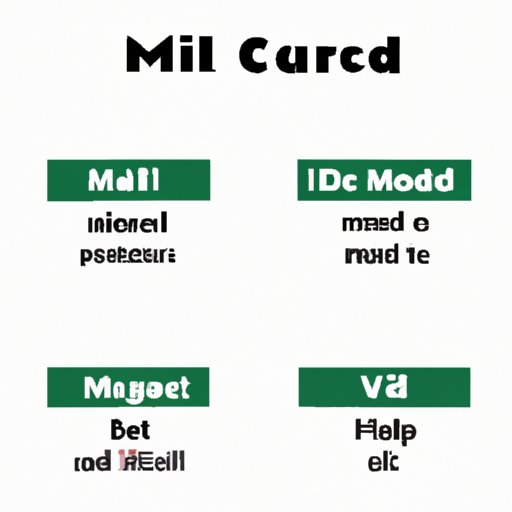I. Introduction
Have you ever struggled with using modal verbs in English? Perhaps you were unsure of which modal verb to use in a sentence, or maybe you struggled with understanding their different meanings and forms. Fear no more, as this guide will provide you with a comprehensive understanding of modal verbs and how to use them effectively. Whether you’re a beginner or an advanced English speaker, you’ll find valuable tips and tricks to improve your modal verb usage.
II. A Beginner’s Guide to Understanding Modals
Modal verbs are a type of auxiliary verb that express the speaker’s attitude towards the main verb. They indicate the degree of certainty, obligation, possibility, permission, or ability of the action or event described in the sentence. Here are some common modal verbs and their meanings:
- Can – ability, permission, possibility
- Could – possibility, politeness
- May – permission, possibility, probability
- Might – possibility, uncertainty
- Must – obligation, necessity
- Should – advice, obligation, probability
- Would – preference, unreal or hypothetical situations
When using modal verbs, it’s important to note that they don’t have an -s on the end when used with he, she, or it. They also function as the main verb in negative sentences and questions, where the main verb is in the base form (infinitive) without the to. For example:
- I can swim. He can swim.
- I can’t swim. Can you swim?
III. The 7 Most Important Modal Verbs in English
The following modal verbs are the most important in English, and they have a wide range of uses and meanings:
- Can – expresses ability, permission, and possibility
- Could – expresses possibility, politeness, and past ability
- May – expresses permission, possibility, and probability
- Might – expresses possibility and uncertainty
- Must – expresses obligation and necessity
- Should – expresses advice, obligation, and probability
- Would – expresses preference and unreal or hypothetical situations
Here are some examples of how these modal verbs are used in everyday language:
- I can play the guitar.
- Could you please pass the salt?
- May I borrow your pen?
- Might I suggest an alternative idea?
- I must leave now.
- You should take a break.
- If I had more time, I would travel the world.
IV. Mastering the Art of Modal Verbs: Tips and Tricks
Now that you’re familiar with the common modal verbs, it’s important to use them effectively in your sentences. Here are some tips and tricks:
- Use modals sparingly. Overusing them can make your text sound awkward or robotic.
- Use the right modal verb for the intended meaning. Each modal verb has different nuances and uses, so choose the one that best expresses what you want to say.
- Use modals to show politeness or uncertainty. Could, may, and might are generally more polite than can or must, and might also expresses uncertainty.
- Use modals to express the degree of certainty. Modal verbs like may, might, and could express more uncertainty than can or must.
- Practice using modals in context. Experiment with different situations and express different meanings to master your skills.
V. Exploring the Complexities of Modal Verbs: An In-Depth Analysis
Modal verbs may seem simple at first glance, but they can be quite complicated. Here are some factors to consider:
- Modal verbs have different forms, including the present tense, past tense, and infinitive form. For example, can becomes could in the past tense, and to can becomes to be able to in the infinitive.
- Modal verbs have different meanings and uses depending on the context. For example, can can mean permission or possibility, whereas must means obligation or necessity.
- There are also lesser-known modal verbs, such as need to, have to, and ought to, which have their own nuances and uses.
- Modal verbs can be combined together in a sentence to express different levels of certainty, obligation, and possibility. For example, might have been can express uncertainty about a past event.
VI. Modals in Context: How to Use Modals to Express Different Meanings
Modals can be used in different contexts to express a wide range of meanings. Here are some examples:
- Formal language: May I request a meeting with you?
- Informal language: Can you meet me later?
- Expressing certainty: It must be raining today.
- Expressing uncertainty: He might be late to the party.
- Expressing obligation: You should finish your homework before playing games.
- Expressing possibility: We might go to the movies tonight.
VII. Using Modals to Improve Your Writing: A Guide for Aspiring Writers
Modals can be a powerful tool for writers to add nuance and clarity to their writing. Here are some ways to use modals effectively:
- Use modals to express a character’s personality or attitude. For example, a character who frequently uses must might appear more serious or rigid than one who uses may or could.
- Use modals to convey different moods or tones. Modals like might or could can convey uncertainty, while must or should can convey confidence or urgency.
- Use modals to show the degree of certainty. Writers can use modals to show whether a character is certain or uncertain about an event or action.
- Use modals to express hypothetical situations or alternative scenarios. Writers can use modals to explore what could have happened or what might happen in the future.
VIII. Conclusion
Modals are a crucial part of English grammar, and mastering their usage can improve your communication skills in all areas of life. By understanding their different meanings and uses, as well as using them in context effectively, you’ll be able to convey your thoughts and ideas more clearly and confidently.
